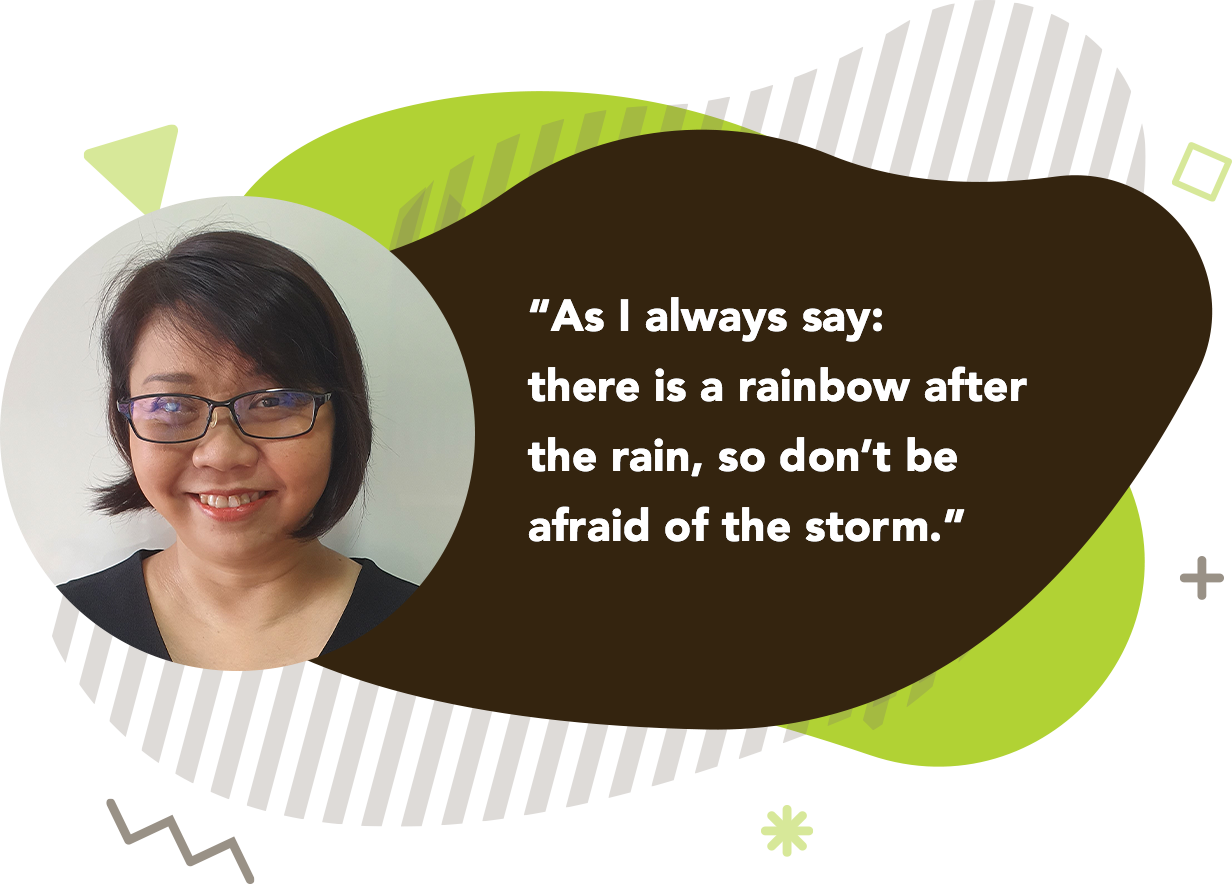
Many have the misconception that risk management is all about crunching numbers, but as Vice President of Risk and Prevention in OCBC's Group Operations and Technology pision, Wong Siew Ling can attest that her typical day is so much more. Her job entails everything from using automated programmes to analyse data and unearthing the root cause of risk events, to running internal hackathons to raise staff awareness on risks and controls.
As a naturally analytical person who is detail-oriented and loves solving problems, she finds her responsibilities—unravelling root causes of risk events, identifying procedural vulnerabilities, and building a strong risk culture—meaningful and motivating.
Poking and Prying with a Purpose
A year ago, Siew Ling's work was just as critical to the organisation, but she performed her tasks, some which are repetitive, without the application of data analytics and programming. It was the Professional Conversion Programme (PCP), as well as her dedication and perseverance, that enabled her to make full use of the latest skills in finance.
"We were having a conversation with our manager on what kind of skills or resources we will need to deliver. [the team's] development plans," she recalls.
They realised that knowledge of data science would help them greatly in terms of better data analysis and automation, and while seeking support from the bank, they found the PCP.
Managed by the Institute of Banking & Finance (IBF), the PCP helps mid-career Professionals, Managers, Executives and Technicians (PMETs) develop the right skills to seize opportunities in the financial industry's growth areas.
"Since there were a lot of other pisions within the bank that were also embarking on the same journey, we said, 'Let's get on board as well.'
Passion and Persistence Pays Off
Setting off to study R and Python programming may seem sexy and exciting, but Siew Ling is quick to admit that she had her own mixed feelings at first, despite having a personal interest in the subject.
"It's been a while since I last learned something that's truly different from what I specialise in," she shares. "So the first thing that came to my mind was whether I had the ability to pick up new skills, especially such technical ones like programming and statistics. Naturally, the fear is there."
And because her PCP was one year long, Siew Ling was also concerned whether she could manage her workload while keeping up with her studies.
But she persevered, powering through thanks to her strong support system at work.

"I really have a very supportive boss," Siew Ling says, gratefully. "She actually helped me with all the work prioritisation, so that at least when I'm away in training, I'm not distracted by work and I can put in a hundred per cent of my time and my heart into my lessons."
She also calls herself "lucky" to have the camaraderie of her fellow course mates and OCBC's Employee Development team, who consistently checked in on her to see if they could help with any challenges she was facing.
"In OCBC we are really like a family, so we support each other in terms of all the organisation needs and goals."
For Siew Ling herself, having persistence was key to not getting demoralised whenever she faced difficulties in her coursework, especially with Python. "I think persistence is something that you need in order to see yourself through to the end. Otherwise, it's quite easy to give up because you'll get stuck on an error," she reflects. "But the wonderful thing about Python is that there's a lot of resources online, and there's this great online community with experts out there who actually take time into giving you a helping hand."
And persistence pays off—she's successfully completed her PCP after 12 months, and she's now better equipped than ever to thrive in her profession.

Putting Her New Skills to Good Work
Through her PCP training, Siew Ling learnt a full spectrum of end-to-end data analysis skills, including programming, statistics, and digital storytelling.
"What I learned most from the entire journey is that not only must you be able to harness value from your data, you must also be able to present it to the interested party, be it Senior Management or someone on the ground."
And in between her once-a-month lessons and mini-projects, Siew Ling was excited to immediately start applying her new skills at work. One thing she did was to develop a Python script together with an intern to automate the dissemination of emails on regulatory matters to appointed representatives within the pision."
"With Python knowledge, I realised that we can automate this process," she shares. "The script can read the email, comb through our Excel files to identify the affected departments, and then disseminate it to the right people."
Now, instead of manually "eyeballing" the email and Excel sheets like she used to, Siew Ling is able to complete all the steps with a simple click of the button. "It has helped to free up some of our time, and it is more efficient and accurate compared to our process before!"
Her next big project? To develop a programme that analyses past operational risk events in order to predict future ones. "That means identifying trends and uncovering insights which our usual analysis could not provide, so that we can put in more effective preventive or detection measures," she shares.
Toward a Stronger and More Positive Risk Culture

Siew Ling also hopes to make risk training and education more interactive. One initiative her department has rolled out is hackathons: employees from different departments within the pision will sign up to participate in the event where they try to "hack" existing processes by pointing out potential vulnerabilities.
The hackathons are gamified: the staff or team that manages to point out a risk area that has not been identified by the process owner wins a prize.
And there are more plans on the horizon. "There are many other things we want to roll out in order to create a positive risk culture for the pision," she shares. To make training more engaging, her team is looking at how they can better utilise different materials, such as videos or even social media, to promote awareness.
Siew Ling hopes that these initiatives will help to uplift the staff capability in risk management and at the same time build stronger rapport so her colleagues in other departments would not hesitate to approach her should risk events arise. For Siew Ling, the bonds she has forged during her PCP journey have helped tremendously in fostering this open relationship.
"The relationship that we have built while we were on course itself actually helps, because then they don't see you as being so intimidating, you're there to help them to look for the root cause and prevent the recurrence."

This article is part of series of stories on PMETs who have gone through an upskilling or reskilling transformation journey within the banking and finance industry.
(Information in this article are accurate as at time of publication, July 2020)

 Overview
Overview


















